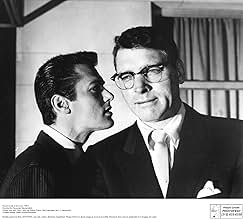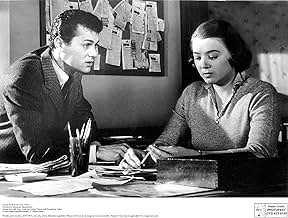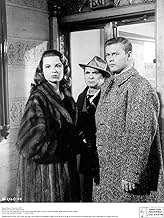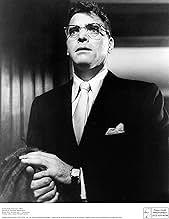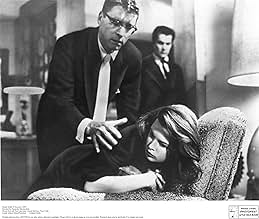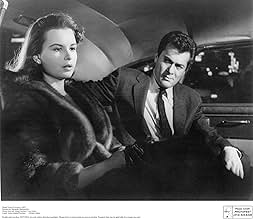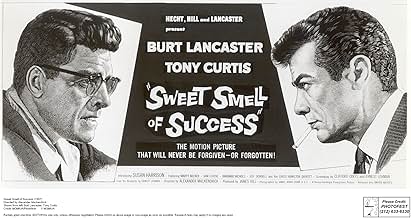NOTE IMDb
8,0/10
38 k
MA NOTE
Le chroniqueur puissant, mais contraire à l'éthique de Broadway J.J. Hunsecker contraint l'agent de presse sans scrupules Sidney Falco à rompre la romance de sa soeur avec un musicien de jaz... Tout lireLe chroniqueur puissant, mais contraire à l'éthique de Broadway J.J. Hunsecker contraint l'agent de presse sans scrupules Sidney Falco à rompre la romance de sa soeur avec un musicien de jazz.Le chroniqueur puissant, mais contraire à l'éthique de Broadway J.J. Hunsecker contraint l'agent de presse sans scrupules Sidney Falco à rompre la romance de sa soeur avec un musicien de jazz.
- Réalisation
- Scénario
- Casting principal
- Nomination aux 1 BAFTA Award
- 3 victoires et 3 nominations au total
Martin Milner
- Steve Dallas
- (as Marty Milner)
Chico Hamilton
- Self
- (as The Chico Hamilton Quintet)
Buddy Clark
- Self
- (as The Chico Hamilton Quintet)
Jay Adler
- Manny Davis
- (non crédité)
Mary Bayless
- Bar Patron
- (non crédité)
Nicky Blair
- Patron at Toots Shor's
- (non crédité)
Nick Borgani
- Waiter
- (non crédité)
Avis à la une
Tony Curtis learns the hard way about the "Sweet Smell of Success" in this 1957 film that stars Burt Lancaster, Sam Levene, Susan Harrison, and Barbara Nichols. In the pre-Internet days when the newspaper was king, the columnists ruled - Winchell, Ed Sullivan, Cholly Knickerbocker, Radie Harris, and let's not forget Hedda and Louella! But the King was Winchell, and while I don't think the Burt Lancaster character of J.J. Hunsecker is modeled on him, the power and control the man wielded certainly is.
Tony Curtis plays one of his best roles as Sidney Falco, a low-ranking press agent who is dependent on people like Hunsecker to mention his clients in their daily columns. But Sidney is on the outs with Hunsecker, a very bad place to be. Hunsecker has ordered Sidney to break up his sister Susan's relationship with a jazz musician, Steve (Martin Milner), and Susan is still seeing him. Sidney comes up with a plan to tear the two apart which probably would have worked, but when Steve stands up to J.J., Hunsecker is out for blood. He demands the plan be taken one step further and dangles an attractive carrot in front of Sidney to make it happen.
Done in black and white with most of the action taking place at night and often on the streets of Times Square, "The Sweet Smell of Success" has an atmosphere of slime and grit. The handsome Lancaster and Curtis are not particularly well photographed - it's not meant to be a glamorous picture. The dialogue is fast, to the point, and witty and the performances are breathtaking. Lancaster underplays the twisted Hunsecker so that his contempt for the people he writes about - and his sick attraction to his sister - can be clearly shown. He could have played it more along the lines of Curtis' Sidney - an obvious, manipulative rat - but it wouldn't have been as right as Lancaster's tightly-controlled J.J.
Curtis was born to play Sidney - an attractive, fast-talking man with no morals who plays both ends against the middle. He's a New York character, ideal for a New York guy like Curtis who grew up on the streets. Sidney is totally outrageous - he invites a cigarette girl to his apartment and then pimps her out to a columnist so he can get an item in his column; he tries blackmailing another columnist, but that backfires. It doesn't stop him from trying again.
The two victims of these piranhas are Susan and Steve, a young couple deeply in love who want to be married. Their simple story is told against a backdrop of scandal, revenge, manipulation and blackmail. Their situation makes the actions of J.J. and Sidney even seedier and more cruel than they already are.
"Sweet Smell of Success" has become a cult classic and was actually mounted at one point as a Broadway musical. Like "Nightmare Alley," it probably was too grim for audiences back then. Is anything too grim for audiences of today? Doubtful.
Tony Curtis plays one of his best roles as Sidney Falco, a low-ranking press agent who is dependent on people like Hunsecker to mention his clients in their daily columns. But Sidney is on the outs with Hunsecker, a very bad place to be. Hunsecker has ordered Sidney to break up his sister Susan's relationship with a jazz musician, Steve (Martin Milner), and Susan is still seeing him. Sidney comes up with a plan to tear the two apart which probably would have worked, but when Steve stands up to J.J., Hunsecker is out for blood. He demands the plan be taken one step further and dangles an attractive carrot in front of Sidney to make it happen.
Done in black and white with most of the action taking place at night and often on the streets of Times Square, "The Sweet Smell of Success" has an atmosphere of slime and grit. The handsome Lancaster and Curtis are not particularly well photographed - it's not meant to be a glamorous picture. The dialogue is fast, to the point, and witty and the performances are breathtaking. Lancaster underplays the twisted Hunsecker so that his contempt for the people he writes about - and his sick attraction to his sister - can be clearly shown. He could have played it more along the lines of Curtis' Sidney - an obvious, manipulative rat - but it wouldn't have been as right as Lancaster's tightly-controlled J.J.
Curtis was born to play Sidney - an attractive, fast-talking man with no morals who plays both ends against the middle. He's a New York character, ideal for a New York guy like Curtis who grew up on the streets. Sidney is totally outrageous - he invites a cigarette girl to his apartment and then pimps her out to a columnist so he can get an item in his column; he tries blackmailing another columnist, but that backfires. It doesn't stop him from trying again.
The two victims of these piranhas are Susan and Steve, a young couple deeply in love who want to be married. Their simple story is told against a backdrop of scandal, revenge, manipulation and blackmail. Their situation makes the actions of J.J. and Sidney even seedier and more cruel than they already are.
"Sweet Smell of Success" has become a cult classic and was actually mounted at one point as a Broadway musical. Like "Nightmare Alley," it probably was too grim for audiences back then. Is anything too grim for audiences of today? Doubtful.
"I love this dirty town". "Match me, Sidney". "Maybe I left my sense of humour in my other suit". Great dialogue. Great script, great cinematography, great acting, great music. Christ, what do you want, blood? From the first moment we see Burt Lancaster as the impossibly sinister J.J., we know we're in for a cracking time. There he is, sitting at the restaurant table, wearing those strangely scary glasses, his face expressionless (perhaps he's smiling, just a little bit), talking to Sidney without even looking at him, firing the dialogue like bullets. When the action seeps into the New York streets, oozing menace, there's J.J. - master of all he surveys, twisting cops round his little finger, snarling and seething like some desperate animal. And there is something animal about this film: its characters writhe and twist in the lights and the shadows - demented, tortured creatures, all of them trying to maintain some semblance of normality, all of them aware, deep down, how corrupt and helpless they are. The symbols of goodness - J.J.'s sister and her boyfriend - are weak, pathetic, hopeless, unable to keep up with the neverending twists and turns of this awful labyrinth of manipulation and cruelty. Curtis and Lancaster were never better, and it's awesome to see them play such grotesque yet believable roles. How do people get like this? Where do they go from here? Perhaps it's best not to think about it, and just wallow in the brilliant nastiness of it all, before maybe going home and getting in the shower for a long, long time.
Another poster "stole" the one line summary I wanted to use: "Match me, Sidney." Damn. It's one of the best lines in the movie. Oh, well.
"Sweet Smell of Success" is a great, wildly entertaining movie. It reminds me of "Dangerous Liasons" in both it's subject ("bad" people making life worse for more decent folk) and how swiftly and imaginatively directed it is. It's juicy from beginning to end. Burt Lancaster is once again terrific as J.J. Hunsecker, Walter Winchell-esque writer of a "society" column which is more of a tool of destruction for those who cross his path.
But it's Tony Curtis who holds the movie together. Always scheming and plotting and never letting a decent human emotion take precedence over his drive to succeed at any cost. He's Marvelous and was never again to achieve what he did here.
But there's a third star to this production and it's New York City itself. The on location photography is stunning. What is amazing is that at the time the movie was made (1957) on location filming was just becoming "in vogue". For a film like this, it HAD to filmed on location or else it's power would be substantially diluted. I work in Manhattan near where a lot of this film was made (J.J. lives in the Brill Building which is on Broadway between 49th and 50th Streets, right around the corner from me). To see what the neighborhood looked like over 40 years ago is amazing. Surprisingly, it's the astonishing on site photography that prevents the film from really feeling dated. Also, the themes in the film are timeless as well.
"Sweet Smell of Success" is a classic from top to bottom.
"Sweet Smell of Success" is a great, wildly entertaining movie. It reminds me of "Dangerous Liasons" in both it's subject ("bad" people making life worse for more decent folk) and how swiftly and imaginatively directed it is. It's juicy from beginning to end. Burt Lancaster is once again terrific as J.J. Hunsecker, Walter Winchell-esque writer of a "society" column which is more of a tool of destruction for those who cross his path.
But it's Tony Curtis who holds the movie together. Always scheming and plotting and never letting a decent human emotion take precedence over his drive to succeed at any cost. He's Marvelous and was never again to achieve what he did here.
But there's a third star to this production and it's New York City itself. The on location photography is stunning. What is amazing is that at the time the movie was made (1957) on location filming was just becoming "in vogue". For a film like this, it HAD to filmed on location or else it's power would be substantially diluted. I work in Manhattan near where a lot of this film was made (J.J. lives in the Brill Building which is on Broadway between 49th and 50th Streets, right around the corner from me). To see what the neighborhood looked like over 40 years ago is amazing. Surprisingly, it's the astonishing on site photography that prevents the film from really feeling dated. Also, the themes in the film are timeless as well.
"Sweet Smell of Success" is a classic from top to bottom.
The main characters in "Sweet Smell Of Success" are two of the most unpleasant, unprincipled and unsympathetic people imaginable. Both are utterly corrupt and would do whatever it takes to achieve their own perverse ends.
J J Hunsecker (Burt Lancaster) is a gossip columnist who wields enormous power in New York and has the ability to make or break the careers of anyone who features in his articles. He plies his vicious trade without any concern for those whose lives he damages and frequently influences people to do his bidding by threatening to expose some unflattering or scandalous information about them. Sidney Falco (Tony Curtis) is a press agent who makes his living by providing material for Hunsecker's column. When Hunsecker becomes unhappy about a relationship that has developed between his sister and a jazz guitarist, he orders Falco to do whatever's necessary to break them up. Hunsecker racks up the pressure on Falco by not accepting any of his contributions for the column until he succeeds in his mission.
Hunsecker's power and threatening manner preclude him from having any genuine or meaningful relationships with other people. He is unconcerned about this but has an unnaturally close relationship with his sister, who on various occasions, he describes as being all that he's got.
In his efforts to get a smear about the guitarist published, Falco threatens to blackmail one columnist by telling his wife about one of his indiscretions with a cigarette girl and also provides another columnist with an inducement to print the story by getting his girlfriend to prostitute herself. He later plants marijuana in the guitarist's pocket and tips off a corrupt police officer who has the guitarist arrested.
Hunsecker thrives on the amount of power and control that he is able to use and it's ironic that he has such a hard time using his power successfully in the area of his life which is most personal and important to him.
"Sweet Smell Of Success" is expertly directed by Alexander Mackendrick and the story and it's characters are considerably more original in nature than those found in the vast majority of movies. The dialogue is impressively incisive throughout and some of the remarks made by Hunsecker are delivered with great panache. When he says "I love this dirty town", the comment exemplifies what he's all about and also highlights the source of his power. His remarks that Falco is a "cookie full of arsenic" and "lives in moral twilight" are typical quick-fire put-downs. These and his "40 faces speech" could seem pretentious and contrived if uttered by some characters but sound perfectly credible when said by Hunsecker, who is clearly very literate and well practised in coining such bitter and brutal insults. Lancaster and Curtis both contribute exceptional performances which must rank among the greatest achieved in their illustrious careers.
J J Hunsecker (Burt Lancaster) is a gossip columnist who wields enormous power in New York and has the ability to make or break the careers of anyone who features in his articles. He plies his vicious trade without any concern for those whose lives he damages and frequently influences people to do his bidding by threatening to expose some unflattering or scandalous information about them. Sidney Falco (Tony Curtis) is a press agent who makes his living by providing material for Hunsecker's column. When Hunsecker becomes unhappy about a relationship that has developed between his sister and a jazz guitarist, he orders Falco to do whatever's necessary to break them up. Hunsecker racks up the pressure on Falco by not accepting any of his contributions for the column until he succeeds in his mission.
Hunsecker's power and threatening manner preclude him from having any genuine or meaningful relationships with other people. He is unconcerned about this but has an unnaturally close relationship with his sister, who on various occasions, he describes as being all that he's got.
In his efforts to get a smear about the guitarist published, Falco threatens to blackmail one columnist by telling his wife about one of his indiscretions with a cigarette girl and also provides another columnist with an inducement to print the story by getting his girlfriend to prostitute herself. He later plants marijuana in the guitarist's pocket and tips off a corrupt police officer who has the guitarist arrested.
Hunsecker thrives on the amount of power and control that he is able to use and it's ironic that he has such a hard time using his power successfully in the area of his life which is most personal and important to him.
"Sweet Smell Of Success" is expertly directed by Alexander Mackendrick and the story and it's characters are considerably more original in nature than those found in the vast majority of movies. The dialogue is impressively incisive throughout and some of the remarks made by Hunsecker are delivered with great panache. When he says "I love this dirty town", the comment exemplifies what he's all about and also highlights the source of his power. His remarks that Falco is a "cookie full of arsenic" and "lives in moral twilight" are typical quick-fire put-downs. These and his "40 faces speech" could seem pretentious and contrived if uttered by some characters but sound perfectly credible when said by Hunsecker, who is clearly very literate and well practised in coining such bitter and brutal insults. Lancaster and Curtis both contribute exceptional performances which must rank among the greatest achieved in their illustrious careers.
There are three reasons that movie fans should check this film out, if you haven't seen it yet:
1 - Outstanding dialog. I can't recall a film in which I heard so many clever film-noir lines as this one. Almost everyone in the movie has a unique way of expressing their feelings. It makes the movie one that you want to go back and HEAR again. Clifford Odets and Ernest Lehman wrote the screenplay and deserve special recognition as well as the people below.
2 - Fabulous acting, led by the two male leads: Tony Curtis and Burt Lancaster. Curtis is the star of the film with many more lines than anyone else, and many consider this to be his greatest acting achievement. I have no quarrel with that. It's one of the finest acting jobs I've ever witnessed by anyone. It's that good.
Lancaster is memorable and plays to his strengths as a tough guy, not only with his physical presence but his tactless and cutting verbal assaults. He has the best and most brutal lines in the film.
The minor characters in here, from the cop to the comedian to the cigarette girl to the young romantic couple are all top-notch.
3 - The cinematography. A big name in the film business, James Wong Howe, more than lives up to his reputation. This is beautifully photographed and looks absolutely stunning on DVD. I have watched hundreds and hundreds of black-and-white films and this ranks with the best of them. He captured nighttime New York City as well as anybody ever has done.
"Well," you might ask, "if this movie is so great, why haven't I heard more about it?"
Maybe because it never did well at the box office. It wasn't promoted a lot, from what I heard, and the storyline is not a pleasant one. Basically, this is about two immoral people who smear a nice guy so that it will ruin the romance between he and Lancaster's sister.
Lancaster plays an absolutely ruthless newspaper columnist who makes and breaks careers and Curtis plays his slimy press-agent who will do anything to please his powerful boss, including doing the worst of his dirty work.
Furrther details of the film can be read by many of the other fine reviewers here on this website, so no need to go into that.
I am not one who generally likes films that feature mostly nasty people but this was done so well that it fascinates me every time. A final tip of the hat to director Alexander Mackendrick. Why he wasn't given more films to direct is a mystery to me. Highly-recommended.
1 - Outstanding dialog. I can't recall a film in which I heard so many clever film-noir lines as this one. Almost everyone in the movie has a unique way of expressing their feelings. It makes the movie one that you want to go back and HEAR again. Clifford Odets and Ernest Lehman wrote the screenplay and deserve special recognition as well as the people below.
2 - Fabulous acting, led by the two male leads: Tony Curtis and Burt Lancaster. Curtis is the star of the film with many more lines than anyone else, and many consider this to be his greatest acting achievement. I have no quarrel with that. It's one of the finest acting jobs I've ever witnessed by anyone. It's that good.
Lancaster is memorable and plays to his strengths as a tough guy, not only with his physical presence but his tactless and cutting verbal assaults. He has the best and most brutal lines in the film.
The minor characters in here, from the cop to the comedian to the cigarette girl to the young romantic couple are all top-notch.
3 - The cinematography. A big name in the film business, James Wong Howe, more than lives up to his reputation. This is beautifully photographed and looks absolutely stunning on DVD. I have watched hundreds and hundreds of black-and-white films and this ranks with the best of them. He captured nighttime New York City as well as anybody ever has done.
"Well," you might ask, "if this movie is so great, why haven't I heard more about it?"
Maybe because it never did well at the box office. It wasn't promoted a lot, from what I heard, and the storyline is not a pleasant one. Basically, this is about two immoral people who smear a nice guy so that it will ruin the romance between he and Lancaster's sister.
Lancaster plays an absolutely ruthless newspaper columnist who makes and breaks careers and Curtis plays his slimy press-agent who will do anything to please his powerful boss, including doing the worst of his dirty work.
Furrther details of the film can be read by many of the other fine reviewers here on this website, so no need to go into that.
I am not one who generally likes films that feature mostly nasty people but this was done so well that it fascinates me every time. A final tip of the hat to director Alexander Mackendrick. Why he wasn't given more films to direct is a mystery to me. Highly-recommended.
Le saviez-vous
- AnecdotesPublicity materials for the film noted cinematographer James Wong Howe spread a film of Vaseline on Lancaster's glasses to create a shine and make his stare more menacing.
- Gaffes(at around 2 mins) When Sidney peruses J.J. Hunsecker's 'The Eyes of Broadway' column on page 21 of the New York Globe newspaper, it can be seen that several of the paragraphs are repeated. Of the nine paragraphs visible, it can be seen that paragraph 7 is an exact copy of paragraph 2; 8 is a copy of 5, and 9 is a copy of 4.
- Citations
J.J. Hunsecker: I'd hate to take a bite outta you. You're a cookie full of arsenic.
- Crédits fousintroducing Susan Harrison
- ConnexionsFeatured in Mackendrick: The Man Who Walked Away (1986)
Meilleurs choix
Connectez-vous pour évaluer et suivre la liste de favoris afin de recevoir des recommandations personnalisées
- How long is Sweet Smell of Success?Alimenté par Alexa
Détails
- Date de sortie
- Pays d’origine
- Langues
- Aussi connu sous le nom de
- La mentira maldita
- Lieux de tournage
- Sociétés de production
- Voir plus de crédits d'entreprise sur IMDbPro
Box-office
- Budget
- 3 400 000 $US (estimé)
- Montant brut mondial
- 8 025 $US
- Durée1 heure 36 minutes
- Couleur
- Rapport de forme
- 1.66 : 1(original ratio)
Contribuer à cette page
Suggérer une modification ou ajouter du contenu manquant

Lacune principale
By what name was Le Grand Chantage (1957) officially released in India in Hindi?
Répondre

